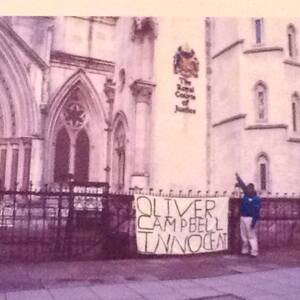100 signatures reached
To: Court of appeal & MP Ben Gummer
Allow Oliver's right to appeal & prove innocent

Allow Oliver Campbell to appeal against the misjustice served on him 25 yrs ago, grant him his basic human right of a fair trial, which will undoubtedly prove his innocence.
Why is this important?
Oliver Campbell was convicted because he suffered from a brain injury and is of low IQ and very suggestible. He 'confessed' to murder to the police in the absence of his solicitor. His co-defendant, Samuels, also convicted of murder, told the police that Oliver wasn't present at the crime and had nothing to do with it, but because he didn't give evidence at the trial, the jury was never aware of this. Since then Samuels has repeated that Oliver is innocent, but the CCRC refuses to use this evidence as grounds to refer the case for a second appeal.
Oliver has now been released, but still seeks to have his murder conviction overturned.
Back in 2002 A television investigation cast doubt on the murder conviction and produced a documentary as part of the series Rough Justice showing their findings.........
(the following is an extract from an old article)
Oliver Campbell has been in jail for 10 years of a life sentence for the murder of an East End off licence owner, Baldee Hoondle, during a robbery in July 1990.
Although Campbell confessed to the crime under interrogation, his lack of legal representation at the time and the strategy employed by the police to gain a confession from a 20-year-old man of limited mental ability have already been said to cast doubt on the case against him. Campbell has since persistently protested his innocence.
Next Sunday the BBC programme Rough Justice will present an analysis which challenges the prosecution's case. It contains a statement from an accomplice to the robbery which, if true, exonerates Campbell, and it claims to be able to name the person who fired the fatal shot.
A crucial piece of evidence was a baseball cap dropped by the murderer as he ran from the off licence. During interrogation, the police told Campbell that his fingerprints were found at the scene and the hairs on the cap matched his. In fact, the forensic tests had not been completed. When they were, no fingerprints of Campbell were found and the hairs were not his.
There is, allegedly, no forensic evidence linking him to the scene.
Later, at an identity parade, neither of the two witnesses to the crime picked out Campbell as the man in the cap. The two robbers were said to be 5ft 10in or 5ft 11in; Campbell is 6ft 3in. Campbell is left-handed while the shot was fired most probably by a right-handed man. Campbell had lived in a number of foster homes and is claimed to be borderline mentally defective.
An accomplice to the crime, Eric Samuels, who was sentenced to five years for robbery, said that Campbell was not the killer. But his evidence was never heard in court.
Campbell may have contributed to the police case by admitting to knowledge of the crime which he had actually got from a BBC Crimewatch programme.
Oliver has now been released, but still seeks to have his murder conviction overturned.
Back in 2002 A television investigation cast doubt on the murder conviction and produced a documentary as part of the series Rough Justice showing their findings.........
(the following is an extract from an old article)
Oliver Campbell has been in jail for 10 years of a life sentence for the murder of an East End off licence owner, Baldee Hoondle, during a robbery in July 1990.
Although Campbell confessed to the crime under interrogation, his lack of legal representation at the time and the strategy employed by the police to gain a confession from a 20-year-old man of limited mental ability have already been said to cast doubt on the case against him. Campbell has since persistently protested his innocence.
Next Sunday the BBC programme Rough Justice will present an analysis which challenges the prosecution's case. It contains a statement from an accomplice to the robbery which, if true, exonerates Campbell, and it claims to be able to name the person who fired the fatal shot.
A crucial piece of evidence was a baseball cap dropped by the murderer as he ran from the off licence. During interrogation, the police told Campbell that his fingerprints were found at the scene and the hairs on the cap matched his. In fact, the forensic tests had not been completed. When they were, no fingerprints of Campbell were found and the hairs were not his.
There is, allegedly, no forensic evidence linking him to the scene.
Later, at an identity parade, neither of the two witnesses to the crime picked out Campbell as the man in the cap. The two robbers were said to be 5ft 10in or 5ft 11in; Campbell is 6ft 3in. Campbell is left-handed while the shot was fired most probably by a right-handed man. Campbell had lived in a number of foster homes and is claimed to be borderline mentally defective.
An accomplice to the crime, Eric Samuels, who was sentenced to five years for robbery, said that Campbell was not the killer. But his evidence was never heard in court.
Campbell may have contributed to the police case by admitting to knowledge of the crime which he had actually got from a BBC Crimewatch programme.
